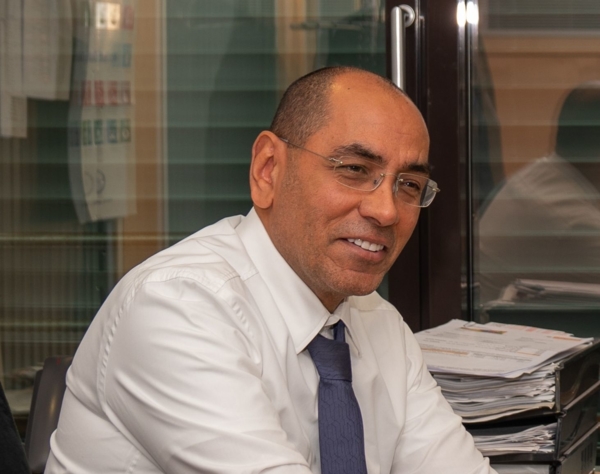We use Cookies. Read our Terms
- News
- The private sector and the SDGs: Bridging the financing gap
The private sector and the SDGs: Bridging the financing gap
The private sector has a major role to play in driving development in low- and middle-income countries if the world is to achieve the 17 Sustainable Development Goals by 2030. The OPEC Fund’s Private Sector and Trade Finance team is fully engaged with the challenge…
As published in the 01/2021 issue of the OPEC Fund Quarterly.
The OPEC Fund was established with a distinct mandate: to drive development, strengthen communities and empower people. Our work is people-centered, focusing on financing projects that meet essential needs,such as food, energy, infrastructure, employment (particularly relating to MSMEs), clean water and sanitation, healthcare and education. Our vision is a world where sustainable development is a reality for all.
While we were once known primarily for our support of public sector development projects, in 1998 and 2006 respectively, our private sector and trade finance (PSTF) operations were launched to support private sector and trade finance-orientated development in low- and middle-income countries. Both facilities have a global remit and are important contributors to lasting development impact.
“The role of the private sector in helping to address the social and economic challenges of development cannot be emphasized enough,” says Assistant Director-General, Private Sector and Trade Finance, Tareq Alnassar. “It is estimated there is a persistent US$2.5 trillion annual financing gap preventing us from achieving the Sustainable Development Goals. Bridging that gap requires removing all constraints to the supply of, and demand for, capital.

“Simply put, the private sector is a provider of income, jobs, goods and services to help enhance people’s lives and increase equality and inclusion. It also can provide governments with the fiscal room to meet basic infrastructure requirements and the tax revenue to tackle urgent priorities and address wider development challenges.”
DFIs such as the OPEC Fund play an important countercyclical role in mitigating the effects of economic downturns, such as the one we are currently facing, and investing efficiently in the private sector is crucial in mitigating the effects of such downturns.
Alnassar also explains how the OPEC Fund’s operations promote social and economic development. "Within the OPEC Fund’s Private Sector and Trade Finance offering, we continue to focus on meeting the needs of our clients and partners in line with the OPEC Fund’s mandate. Understanding the ambitions and goals of our clients and the need for responsiveness, especially in these COVID-19 times, we continue to scaleup and adapt our funding to support critical sectors in our beneficiary countries. This has been done in several ways, including supporting MSMEs’ access to finance through financial intermediaries by providing the latter with much-needed capital and liquidity, addressing bottlenecks in the food supply chain through trade finance instruments and providing long-term critical infrastructure support.
“We finance private sector projects with well-defined development objectives in line with the United Nations 2030 Agenda for Sustainable Development,” adds Alnassar.
“Since launching, for example, we have supported over 350,000 MSMEs; directly generated 304 MW of electricity capacity (and contributed to 3.9 GW capacity generation in total); and working with partners, we have supported annual airport passenger traffic of 29 million people.
“Through the trade finance facility, we support private businesses and governments to import and export strategically important commodities and capital goods,” he adds. “Our trade finance operations help to strengthen regional integration, economic diversification and value chains. In 2020, we supported several projects in the agricultural sector, while through our numerous risk-sharing programs we have facilitated international trade or over 7,500 beneficiaries over the years.
Cumulatively, since the two finance mechanisms were established, nearly 300 projects have benefited from US$3.74 billion of private sector finance, while 200 projects have received US$4.24 billion in trade finance. Nearly 50 percent of operations are located on the African continent, 30 percent in Asia, 15 percent in Latin America and the Caribbean and 5 percent in Europe. More than one-third of approvals support the financial services and banking sector, one-quarter is earmarked to strengthen energy generation, distribution and efficiency while the rest is split between sectors including agriculture, communications, health and transport and storage.
Nearly 50 percent of operations are located on the African continent, 30 percent in Asia, 15 percent in Latin America and the Caribbean and 5 percent in Europe. More than one-third of approvals support the financial services and banking sector, one-quarter is earmarked to strengthen energy generation, distribution and efficiency while the rest is split between sectors including agriculture, communications, health and transport and storage.
Meet some members of our team
OPEC Fund Investment Manager, private sector and trade finance
Officer stories: Cynara Salmans
OPEC Fund Investment Manager, Private Sector and Trade Finance
Officer stories: Adebayo Babalola
OPEC Fund Investment Manager, Private Sector and Trade Finance
Officer stories: Luiscela Moreno
OPEC Fund Senior Investment Manager, private sector and trade finance
Officer stories: Khalid Khadduri
OPEC Fund Investment Manager, Private Sector and Trade Finance